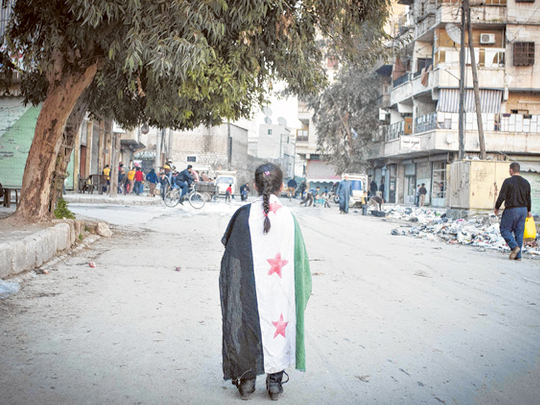
Damascus: Rebels in northern Syria have seized most of a military base, their third major battlefield success in as many days, as US Secretary of State John Kerry called on President Bashar Al Assad to step down.
Kerry said Al Assad needed to abandon hopes of riding out the war and instead accept the “inevitability” of his departure, hours after a monitoring group reported rebels were almost in complete control of the base in Aleppo province.
“We need to address the question of President Al Assad’s calculation currently,” he told reporters. “I believe there are additional things that can be done to change his current perception.”
Kerry added, after talks with Jordan Foreign Minister Nasser Judah, that he was convinced - given the current situation on the ground - “that there is an inevitability here” although it “hasn’t sunk into him yet”.
And he hinted that the US and Jordan could take renewed steps to urge key Syrian ally Russia to bring more pressure on Al Assad to quit. Kerry said that Jordan’s King Abdullah II was expected to visit Moscow.
Russia earlier insisted it was ready to host talks with both sides in the conflict which has a death toll approaching 70,000.
In Moscow, a top Russian diplomat said Syrian Foreign Minister Walid Al Mua’alem and Ahmad Muath Al Khatib, the head of the opposition umbrella National Coalition, would make separate visits for talks in the coming weeks.
Syrian state television reported that the foreign ministry welcomed the invitation, while stressing that the minister would not meet opposition leader Khatib personally.
UN chief Ban Ki-moon appealed to the Security Council to overcome its paralysis.
In Syria, at least another 145 people were killed across the country Wednesday, including 66 civilians, said the Syrian Observatory for Human Rights.
It also reported the rebels’ seizure of most of the military base in Aleppo province, in the north.
The majority of Base 80 “has come under insurgent control” a day after rebel fighters launched a coordinated assault on two airports that the strategic facility’s troops are tasked with securing,” it said.
Dozens on both sides were killed, said the Britain-based group which relies on a network sources on the ground for its information.
The insurgents on Tuesday overran a military air base at Al Jarrah, also in Aleppo province, after seizing Syria’s largest dam in the neighbouring province of Raqa, to the east, the day before.
Activists say Aleppo’s insurgents have shifted their focus from targets in the provincial capital to military bases because of the ammunition and weaponry there, but also to put out of action warplanes used to bomb rebel bastions.
In Aleppo city itself, electricity and water supplies were down for a fourth day, said the anti-regime Aleppo Media Centre, warning of a “humanitarian disaster” in what was once Syria’s commercial hub.
Commenting on the rebels’ advance in Aleppo province, Observatory director Rami Abdul Rahman told AFP the army might have decided to give up on parts of northern Syria in order to secure the centre.
“The regime understands it cannot survive a transition without securing some land to bargain with,” he added.
Regime warplanes nevertheless carried out several air raids on rebel areas in Aleppo province while army tanks shelled the east Damascus district of Jobar, the Observatory said.
Insurgents have secured enclaves in the eastern and southern suburbs of Damascus, and the army is trying hard to push them out.
Dozens of people in neighbouring Lebanon cut off two northern border crossings with Syria, at Tartus and Aabudiyeh, meanwhile, in protest at the transfer of diesel fuel tanks to the Syrian regime, demonstrators said.
The crowd blocked trucker routes by piling stones and other objects, forcing dozens of Syrian cars, buses and trucks to back up.
“We will not allow the passage of gasoline and diesel fuel tankers, because this fuels goes to the military efforts of the regime of Bashar Al Assad,” Moin Al Meraabi, a member of Lebanon’s anti-Damascus Future Movement, told AFP.
The Syria conflict broke out when Al Assad’s forces launched brutal crackdown on democracy protests that erupted in March 2011, inspired by the Arab Spring uprisings.












